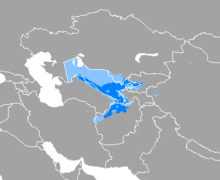Uzbek (O'zbek tili or O'zbekcha in Latin script, Ўзбек тили or Ўзбекча in Cyrillic script, أۇزبېك تیلی in Arabic script) is a Turkic language. It is the official language of Uzbekistan. It has about 40 million native speakers. It is spoken by the Uzbeks in Uzbekistan and elsewhere in Central Asia. Uzbek belongs to the southeastern Turkic or Karluk family of Turkic languages.
| Uzbek | |
|---|---|
| Oʻzbekcha, Oʻzbek tili, Ўзбекча, Ўзбек тили, اوزبیکچه, اوزبیک تیلی | |
| Native to | Uzbekistan, Afghanistan, Tajikistan, Kazakhstan, Kyrgyzstan, Turkmenistan, Russia, China |
| Ethnicity | Uzbeks |
Native speakers | 32 million (2017)[1] |
Early forms | |
| Latin, Cyrillic and Arabic (used in Afghanistan and China), Uzbek Braille (Uzbek alphabets) | |
| Official status | |
Official language in | |
Recognised minority language in | |
| Regulated by | Tashkent State University of Uzbek language and literature |
| Language codes | |
| ISO 639-1 | uz |
| ISO 639-2 | uzb |
| ISO 639-3 | uzb – inclusive codeIndividual codes: uzn – Northernuzs – Southern |
| Glottolog | uzbe1247 |
| Linguasphere | 44-AAB-da, db |
 Dark blue = majority; light blue = minority | |
Uzbek edition of Wikipedia, the free encyclopedia
References
change- ↑ Uzbek at Ethnologue (18th ed., 2015)
Northern at Ethnologue (18th ed., 2015)
Southern at Ethnologue (18th ed., 2015) - ↑ Scott Newton (20 November 2014). Law and the Making of the Soviet World: The Red Demiurge. Routledge. pp. 232–. ISBN 978-1-317-92978-9.